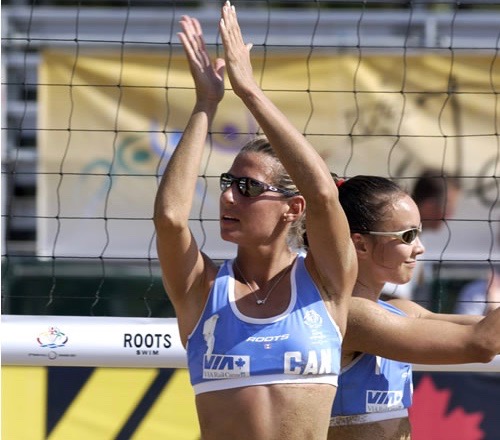- Anti-Racism Tip #8: If It Needs a Disclaimer, Don’t Say It - October 18, 2022
- On Tender Moments that Take Us By Surprise - May 18, 2022
- Finding Creative Ways to Exercise During the Pandemic - April 29, 2022
Sometimes at our very lowest moments, we’re able to draw on our deepest wells of resilience and perform our very best. This is the paradox of resilience.
Here’s a story that illustrates this paradox for me.
How the Worst Summer of My Life Turned into My Very Best
It was the summer of 2000.
I had been dating this great guy for five years. We both played on the indoor Varsity volleyball teams. After he finished playing Varsity volleyball he went to play on a professional team in the Netherlands while I attended law school.
We had kept our long distance relationship going during that first year but it was hard. He was feeling homesick and kept talking about how he wished one of his brothers or sisters could come out and stay for a year with him and tour around. So I decided that if I could land a contract on an indoor professional volleyball team in the same country, I would take the year off of law school and join him.
My boyfriend arranged for three tryouts with Division 1 teams. Although I had only been playing beach volleyball for those two years, I managed to get two offers. I chose the team that was closer to Amsterdam and about an hour drive from where his team was located.
We had a great year. We trained and competed separately during the week and then saw each other every weekend. When possible, we would watch each others’ games and go sightseeing.
That year off from law school was just what I needed. I sketched, I took martial arts classes for the first time, I read classic novels and I slept a lot. My first two years of law school had been extremely stressful and that year off was a much needed time to restore my energy and enjoy life again.
It was also a real honour to be able to just compete professionally for my living. As the starting setter, my team finish in the top 4 and earn a berth into the prestigious European League for the following year. My boyfriend’s team finished first, as expected, and secured their spot in the European League as well.
We both returned home and planned to spend part of the summer together in British Columbia visiting family before I headed back to Ontario to compete in the National Tour for Beach Volleyball.
Within two weeks of arriving back, he dumped me. I was blind-sided, shocked, and heart-broken.
My family came to the rescue. My two sisters commiserated with me. My Aunt Char brought me tea, a magazine about all the amazing eligible bachelors out there, and chocolate.
I cut my visit to BC short and flew back to Ontario in time for my long-time friend’s wedding. I had initially told her I couldn’t make it but decided that since I didn’t need to be in BC any longer I would show up to support her. Besides, we had planned to compete in beach volleyball together as partners for that whole summer.
The wedding was hard for me to attend but I am glad I went. Once I got home to Toronto, I was fortunate to be living with my Mom, who provided the emotional support I needed to heal.
I decided to pour all my energy, time and money into beach volleyball. The summer of beach volleyball didn’t go smoothly as I had hoped, I got dumped by that same long-time friend (yep…the one that I had flown back early to attend her wedding) for a different partner just two weeks before the National Championships.
I ended up with a new partner, Tricia D’Amata Stragliotto, who I had practiced with just two times before the National Championships. Tricia was new to beach volleyball and an amazing indoor volleyball player. We were ranked close to last and no one, including us, knew what to expect.
During that tournament I have never played so well. I was laser focused and relaxed. I remember moments when I chose to let the outcome go and just focus on each point as it came. It was one of those competitions that athletes strive to experience: those competitions when everything seems to be going in slow motion and everything seems to go your way. I was in the zone. And Tricia played amazing as well.
Here’s one example about how everything seemed to go our way.
In the semifinals, we matched up against two good friends who were ranked second in the tournament. They were a great team: they had a lot more experience playing together and were expected to make it to the finals. It was pouring rain and very windy and Tricia and I were not handling the conditions well.
The other team was beating us handily and the score was 10-5 (this was back when the games only went to 15). Then a lightening storm hit. The announcer told all players to pause their matches and seek cover until the lightening passed (people standing on an open beach can get hit by lightning). The other team protested and kept saying that we should just keep playing. We disagreed and complied with the directions of the tournament director. We all went to stand under the tent.
Many of you know that volleyball is a momentum sport: this means that when you’re winning you just want to keep the play going as quickly as you can. Conversely, when you’re losing, you need timeouts and breaks to try to stop the other team’s momentum. So this break was great for us.
When we resumed the game 20 minutes later, the sun was shining. The wind had died down and the conditions were perfect for beach volleyball. My partner and I started playing really well. The other team was shaken. We ended up winning the match 15 -12.
They were devastated. We were elated.
We had just become Canadian National Beach Volleyball Champions!
This story illustrates the paradox of resilience. As Froma Walsh notes “the paradox of resilience is that our worst times can also bring out our best as we rise to meet the challenges.”
That summer I had been dumped twice – first by my long-time boyfriend and then by my long-time friend. It had been A. TERRIBLE. SUMMER. But in the midst of all that emotional turmoil, I had played my very best. And ironically, winning that National Championship had turned that summer into one of the best summers of my life.
So even at our worst moments, we can draw on our mental, emotional and physical resilience to meet the challenges that face us. When things get tough, we have the resources within us to handle it. And although our well of inner resilience is deep, it isn’t always the only thing we need to carry us through: having family and others around to support us is really important to heal from heartbreak and trauma.
So in your lowest moments, remember the paradox of resilience. Lean on others and look within yourself for the resources you need to keep moving, keep performing, and keep going. Pour yourself into something you enjoy. And through the paradox of resilience, you just might find that you’re stronger and more resilient than you think.
We would love to hear your thoughts in the comments section below. And if you liked this article, share it!
Photo: Tricia Stragliotto D’Amata and Kirsten Manley-Casimir cheering after a win at the Francophone Games 2001
If you enjoyed this article, check out:


What a great story on resilience! You are not just resilient but also an incredible human being. With tremendous respect!
Thanks Hernan! I know you have many similar stories where the challenges you faced were much more serious, including to your personal safety. I appreciate you taking the time to read and comment! With tremendous respect back!
Thank you
You’re welcome – thanks for reading and commenting!
Kirsten’s article’ The Paradox of Resilience’ beautifully deliberates that how we can face the unknown challenges of life.
She met serious setbacks in her life with the loss of two close relationships. These losses opened the floodgates of hidden energies in her and she pursued her goals with strong determination to achieve successes. She proved that our losses could be a blessing in disguise.
Optimism and pursuance pays off in the long run.
Thanks Shankar for this important reflection on how the setbacks I encountered opened the floodgates of inner energies – I love that visual. And you’re right optimism and perseverance certainly do pay off in the long run.